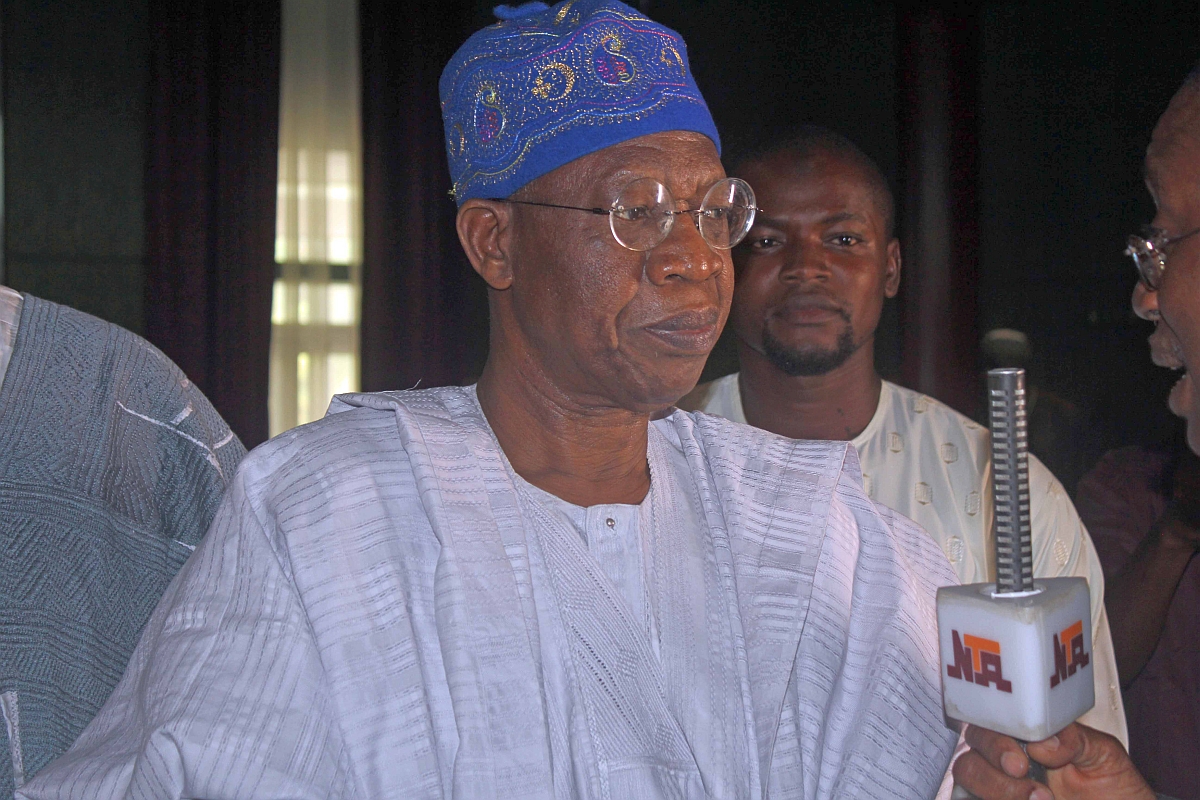- Critics of $1bn For B’Haram Fund Uninformed
The Federal Government has described as unnecessary, uninformed and highly-partisan the criticism of the recently approved $1bn by the Nigeria Governors Forum for the military to tackle the country’s security challenges.
It noted that the criticism was uninformed and unnecessary because everyone knew the military’s role in combating the numerous security crises, including insurgency, facing the country.
The Minister of Information and Culture, Alhaji Lai Mohammed, stated this in Lagos on Tuesday, during a press conference.
He said, “There has been an unnecessary, uninformed and highly-partisan criticism of the $1bn which was recently approved by the Nigeria Governors Forum for the military to tackle the security challenges facing the country, including Boko Haram, illegal oil bunkering, kidnapping and cattle rustling.
“I said unnecessary and uninformed because everyone knows the role the military is playing in helping to tackle the numerous security crises facing the states, let alone the war against Boko Haram.
“The fact that Boko Haram has been largely degraded does not mean the war is over. As we have said times without number, asymmetric wars like the one against Boko Haram, do not end with an armistice. It is therefore curious that some of those who have criticised the $1bn approval have hinged their argument on the fact that Boko Haram has been degraded. Perhaps also, the critics do not know that fighting an asymmetric war is costlier than fighting a conventional war. In any case, wars, especially the war against terror, are never fought with budgetary provisions.”
The minister added that it was common knowledge that the annual military budget was not commensurate with the internal security challenges facing the country for which it had repeatedly relied on the military to assist the police and the civil defence corps.
The minister added, “When insurgents take over a chunk of our nation’s territory, we turn to the military. When the farmers/herders, clashes escalate, we turn to the military. When kidnappers up their game, we turn to the military, when illegal oil bunkerers and pipeline vandals are seeking to overwhelm our oil production and export, we turn to the military, when ethno-religious clashes occur, we turn to the military. But when it is time to give the military the resources it needs to function, we say it is a waste of scarce resources, we come up with spurious reasons to deny the military its due.”
Quoting from the scriptures that “to whom much is given, much is expected,” Mohammed stated that it presupposes that to whom much was expected, much should be given.
According to him, the NGF acted wisely in approving the withdrawal of $1bn from the Excess Crude Account to fight Boko Haram and other security challenges in the country.
He also queried whether the money was too much for the military to tackle insecurity at this time with the security of lives and property being the core of any government and the NGF attesting to this by approving the fund withdrawal of the money from the ECA.
The minister said, “Let’s get down to the brass tacks by looking at the operations of just one arm of the Nigerian Armed Forces. In this case, the Nigerian Air Force, in tackling one of the security challenges facing the nation. Let’s take the Boko Haram insurgency.
“The aircraft being used for the war, including fighter jets and helicopters, altogether consume 64,021.08 litres of fuel per day. With the aircraft flying a total of about 30 sorties a day, and at N275 per litre, it costs a total of N15,153,428.25 daily to fuel the aircraft.
“The spares for the aircraft from January to November 2017 cost a total of N20,019,513,739.88, while consumables for the aircraft, and I am talking of engine oil, plugs etc, amounted to N3,863,600 monthly and N46,363,200.00 yearly. What about the cost of ammunition? Just for 42 days, from November 5 to 17 December, the cost of ammunition was over $5m.
“Since we are using the air force as a reference point, what about the cost of acquiring air force platforms? For example, the 12 Super Tuscano aircraft recently approved for sale to Nigeria by the US Government costs a whopping $490m, yet this is government to government contract, and the costs of spares, munitions and other consumables are not included! Let’s remember that the costs stated above are for the air force alone and restricted to operations in the North-East alone.”
He noted that the above cost excluded that of the army and the navy also fully involved in the war against insecurity.
“Neither have we included the operating cost of the Nigerian Air Force in the Niger Delta to curb pipeline vandalism, in the North-West to contain cattle rustlers, in the North-Central to curtail herdsmen and farmers’ clashes or kidnappings, armed robberies and separatism in other parts of the country,” Mohammed stated.
He further said that if the military had been better equipped to tackle Boko Haram in the early days of the insurgency, thousands of lives, including those of security officers, could have been saved.
Describing the NGF’s action as patriotic and right but not unprecedented, Mohammed said because some people under a different government looted funds meant for the military did not mean the military should be left to its own devices.
The minister added, “Or that every allocation to the military will suffer the same fate. Ours is a disciplined government that does not allow allocated funds to end up in private pockets or spend on prayers. We will always empower the military and other security agencies to be better able to carry out their tough tasks.”

 Naira3 weeks ago
Naira3 weeks ago
 News4 weeks ago
News4 weeks ago
 Naira4 weeks ago
Naira4 weeks ago
 Jobs3 weeks ago
Jobs3 weeks ago
 Naira3 weeks ago
Naira3 weeks ago
 Travel3 weeks ago
Travel3 weeks ago
 Naira3 weeks ago
Naira3 weeks ago
 Investment4 weeks ago
Investment4 weeks ago






























